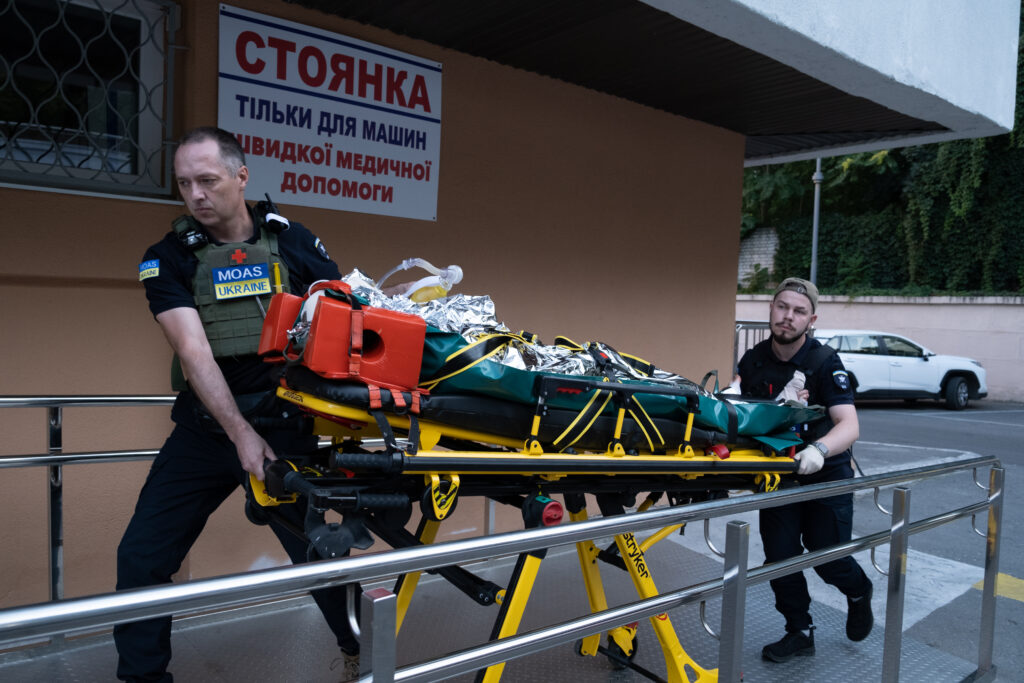Every year, on the 7th of April, the World Health Organisation (WHO) celebrates the World Health Day. According to the WHO “at least 140 countries recognise health as a human right in their constitution. Yet countries are not passing and putting into practice laws to ensure their populations are entitled to access health services. This underpins that at least 4.5 billion people — more than half of the world’s population — were not fully covered by essential health services. To address these types of challenges, the theme for World Health Day 2024 is ‘My health, my right”.
Today, health is not a right guaranteed in the areas where conflicts destroy hospitals, infrastructure, and the health system, leaving millions of people with illnesses, injuries, and mental health problems. According to the Uppsala Conflict Data Program, which has been tracking wars globally since 1945, the last two years were the most conflictual since the end of the Cold War.
Our experience in conflict zones has shown us the devastating impact on people’s health, starting from our aid delivery of therapeutic food and vital medical supplies against malnutrition in Yemen and Sudan, to the MOAS medical mission in Ukraine, aimed to bring emergency medical aid to the people affected by the conflict and cut off from healthcare services, due to the escalation of the fighting.
Ukraine
The ongoing war in Ukraine has caused immense devastation to the country’s healthcare system. Hospitals and clinics have been directly targeted, with essential equipment damaged or destroyed. Medical staff have fled, leaving critical shortages in personnel. Disruptions to supply chains have led to medication shortages, making it difficult to treat chronic illnesses and manage emergencies. Internally displaced people face big challenges accessing healthcare. Over 10 million Ukrainians have been forced to flee their homes, often to areas with limited medical facilities. According to the UN Office for the Coordination of Humanitarian Affairs (OCHA), in 2024, 14.6 million people, about 40% of Ukraine’s population, will need humanitarian assistance. On the report of the WHO Surveillance System for Attacks on Health Care (SSA), in Ukraine “a concerning new trend has emerged: ambulance workers and other personnel servicing health transport face a risk of injury and death 3 times higher than that of other health-care service workers”.
Our skilled teams of 150 doctors, nurses and paramedics working tirelessly has saved more than 40,000 lives on the frontline so far, and over 28,000 in communities cut off from medical infrastructure, thanks to the collaboration with our partners.
Sudan
Sudan is a country that, for decades, has been experiencing conflict and political instability. Between April and October 2023, with the outbreak of the new conflict, Sudan had newly displaced nearly 6 million people, and driven over 1.4 million people into the neighboring countries.
The conflict has led to the severe compromise of healthcare services, with only one-third of hospitals in conflict zones operational. “Of the 59 hospitals out of service in conflict zones, 17 were attacked by artillery and 20 were evacuated, of which 12 have been forcibly militarized and converted into barracks. The remaining hospitals suspended services due to power outages, shortage of fuel for generators, lack of medical supplies and critical lack of health workers. Violence against health workers has escalated”. Outbreaks of infectious diseases like cholera, measles and dengue are a constant threat, due to worsening water sanitation and hygiene conditions.
“78,000 children under 5 years of age are dying every year, and it is estimated that this figure will triple if investments within the health sector continue to decline”, Unicef states. A significant portion of the population grapples with insufficient access to food. To date, according to the WFP, nearly 18 million people are facing acute food insecurity, of whom 5 million are in emergency levels of hunger. This number has tripled since 2019 and is growing month by month.
In 2023, MOAS launched a humanitarian relief mission to help the affected Sudanese population by delivering medical supplies and nutritional supplements targeted specifically to children suffering from acute malnutrition.
Yemen
Since 2014, Yemen has experienced widespread conflict, with an estimated 21.6 million people needing humanitarian assistance or protection (72 % of the total population), including 12.9 million children, four out of five children. Over 17 million people in Yemen cannot afford sufficient food to meet their daily needs, and 4.5 million people are internally displaced. The healthcare system has been decimated: 46% of all health facilities are only partially functioning or completely out of service due to shortages of staff, funds, electricity, medicines, and equipment.
A critical shortage of medicines and medical equipment leaves public health hanging by a thread. Outbreaks of cholera and diphtheria expose the precarious situation. Young children and mothers, already lacking basic and obstetric care, clean water, sanitation, food, and shelter, become even more vulnerable to these infections.
Millions of Yemenis are on the brink of famine due to food shortages and rising food prices. Children are particularly vulnerable to malnutrition.
To respond to this tragic humanitarian emergency, since 2019 MOAS has been providing pharmaceuticals and medical equipment, and specialist malnutrition treatments for children.
Final Thoughts
The situation in Ukraine, Sudan, and Yemen represents the suffering of millions across the globe caught in the crossfire. As we commemorate World Health Day, let us call for an end to armed conflicts and work towards a world where everyone, everywhere, has access to the healthcare they need, building a future where health is not a privilege but a right.
If you are interested in the work of MOAS and our partners, please follow us on social media, sign up for our newsletter and share our content. You can also reach out to us at any time via [email protected]. If you want to support our operations, please give what you can at www.moas.eu/donate.

